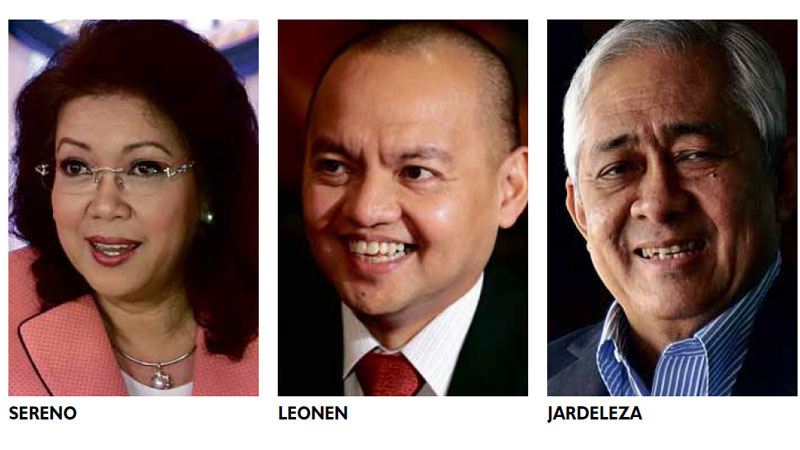
Associate Justice Francis Jardeleza emphasized this Tuesday in a lengthy interpellation of Comelec Commissioner Arthur Lim on what the magistrate repeatedly described as the lack of a “factual finding” on Poe’s disputed citizenship in the poll body’s en banc rulings that had canceled her certificate of candidacy (COC) for President.
Jardeleza cited how the Comelec may “have violated the constitutional rights” of Poe in ruling that the senator, an infant abandoned in a church in Jaro, Iloilo City, in 1968, is not a natural-born Filipino and is, hence, not qualified to run in the May presidential election.
“While you are not staking a claim that foundlings are conclusively presumed to be aliens, it bothers me that effectively, you are,” Jardeleza told Lim during his three-hour questioning.
“How can she establish [her parentage] when she doesn’t even know her mother and father?” he added.
Jardeleza said the Comelec was “really positing a conclusive presumption that foundlings, conclusively under the Constitution, are not natural-born” despite the lack of such an explicit provision.
“And that really bothers me … because I think you, the Comelec, crossed the line,” he said. “You have deprived petitioner Poe of her due process right to have her claim to natural-born status dismissed without considering the evidence.”
Support for Poe
Jardeleza’s position came in a seeming support of Poe’s stand as she fights her disqualification in the Supreme Court even as she officially launched her campaign Tuesday in Quiapo, Manila. Poe recently returned to the top of a pre-election survey.
“Where in the two en banc resolutions of Comelec did it make a finding of fact based on the other evidence presented that petitioner is or is not natural-born? In fact what you seem to have done in both petitions is [that] you only ruled as a matter of law that she is not natural-born because of your reading of the Constitution,” Jardeleza said.
Lim asserted that the Comelec did make findings of fact, but added that “there was no need” to do so as the body only had to rule on whether or not Poe had committed material misrepresentation in declaring citizenship and sufficient years of residency in her COC.
“We discussed all the nitty gritty,” Lim said.
He said the Comelec had stipulated on Poe’s assertions, saying: “Why would it be necessary that we should measure the height of Senator Poe, or that we made a census of the population of Iloilo?”
Plain reading
Lim said the Comelec’s ruling was anchored on a plain reading of the 1935 Constitution, which excludes foundlings in the definition of who is a natural-born citizen. The old Constitution covers Poe, having been born in 1968.
“Where the language is clear, only application is required, interpretation is not allowed,” Lim told Jardeleza. “Did we commit abuse of discretion and gravely at that? That is the issue.”
Saying he continued to “agonize” over the case, Jardeleza implored Lim to answer his questions in detail in Comelec’s memorandum, where it would wrap up its arguments against Poe’s petition at the end of the proceedings.
He suggested that Lim read up on articles of American jurists on “the great silence of the Constitution” on certain matters, which might help address questions on its intent.
Jardeleza said there was no need to invoke international law, as earlier discussed on oral arguments, as the status of foundlings “must be resolved by us as a sovereign nation.”
No criteria
“You don’t have to go far… We must decide this case only based on due process and the equal protection clause,” Jardeleza said, citing the bill of rights.
Associate Justice Teresita Leonardo-de Castro, who had earlier made her position against Poe apparent, issued a quick counterpoint against Jardeleza’s arguments, saying the citizenship of foundlings may not be settled “based on his or her features.”
“If there is no law or provision of the Constitution establishing criteria or citizenship of a foundling, then you will have no justification at all if there is no criteria laid down by law to say a foundling is natural-born,” she said.
“There must be empirical basis to determine whether or not a foundling is a biological child of a Filipino citizen,” De Castro said, getting Lim to concur.
The magistrate also cautioned against use of American jurisprudence and legal wisdom in the case, as Jardeleza had suggested, saying Philippine law was different.
The high court scheduled another round of oral arguments on Feb. 16.
Chief Justice Maria Lourdes Sereno and Associate Justice Marvic Leonen in previous hearings likewise supported Poe’s emotional plea that the issue centered on the human right of foundlings in spite of the explicit mandate in the Constitution that no person should be elected President unless he is a natural-born citizen and had 10 years residency.